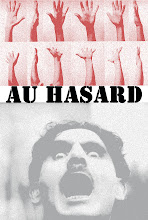Free and Open to All - Alternate Saturdays from 1pm
Location: Room B18, Birkbeck College, Malet Street, London, WC1E 7HX
I. INCARCERATION - Saturday 21st January
'The wind bloweth where it listeth, and thou hearest the sound thereof, but canst not tell whence it cometh, and whither it goeth.' John 3, 8
1pm
A Man Escaped, or The Wind Bloweth Where it Listeth
Directed by Robert Bresson (France, 1957, 99 mins)
2.50pm
The Woman of the Dunes
Directed by Hiroshi Teshigahara (Japan, 1964, 123 mins)
II. GUILT - Saturday 4th February
'After all, our department, as far as I know, and I know only the lowest level, doesn't seek out guilt among the general population, but, as the Law states, is attracted by guilt and has to send us guards out. That's the Law. What mistake could there be?' Franz Kafka
1pm
Death by Hanging
Directed by Nagisa Oshima (Japan, 1968, 117 mins)
3.15pm
The Round Up
Directed by Miklós Janscó (Hungary, 1965, 95 mins)
III. SUBMISSION - Saturday 18th February
'Every good servant does not all commands.' William Shakespeare
1pm
The Servant
Directed by Joseph Losey (UK, 1963, 112 mins)
3pm
The Diary of a Chambermaid
Directed by Luis Buñuel (France/Italy, 1964, 97 mins)
IV. MARQUIS DE SADE - Saturday 10th March ***note change of date***
'What De Sade was trying to bring to the surface of the conscious mind was precisely the thing that revolted that mind... From the very first he set before consciousness things which is could not tolerate.' Georges Bataille
1pm
Marat/Sade (The Persecution and Assassination of Jean-Paul Marat as Performed by the Inmates of the Asylum of Charenton Under the Direction of the Marquis de Sade)
Directed by Peter Brook (UK, 1967, 116 mins)
3pm
Salo, or the 120 Days of Sodom
Directed by Pier Paulo Pasolini (Italy, 1975, 116 mins)
V. CHILDHOOD - Saturday 17th March
'Oh hours of childhood,
when behind each shape more than the past appeared
and what streamed out before us was not the future.'
Rainer Maria Rilke
1pm
Zero For Conduct
Directed by Jean Vigo (France, 1933, 41 mins)
1.50pm
Le Révélateur
Directed by Philippe Garrel (France, 1968, 67 mins)
3.15pm
Viva La Muerte
Directed by Fernando Arrabal (France, 1971, 90 mins)
VI. MUTINY - Saturday 31st March
'The very forms of organization of the struggle will suggest... a different vocabulary - Brother, sister, friend.' Franz Fanon
1pm
Kanal
Directed by Andrzej Wajda (Poland, 1956, 95 mins)
2.50pm
The Battle of Algiers
Directed by Gillo Pontecorvo (Algeria, 1966, 121 mins)




















